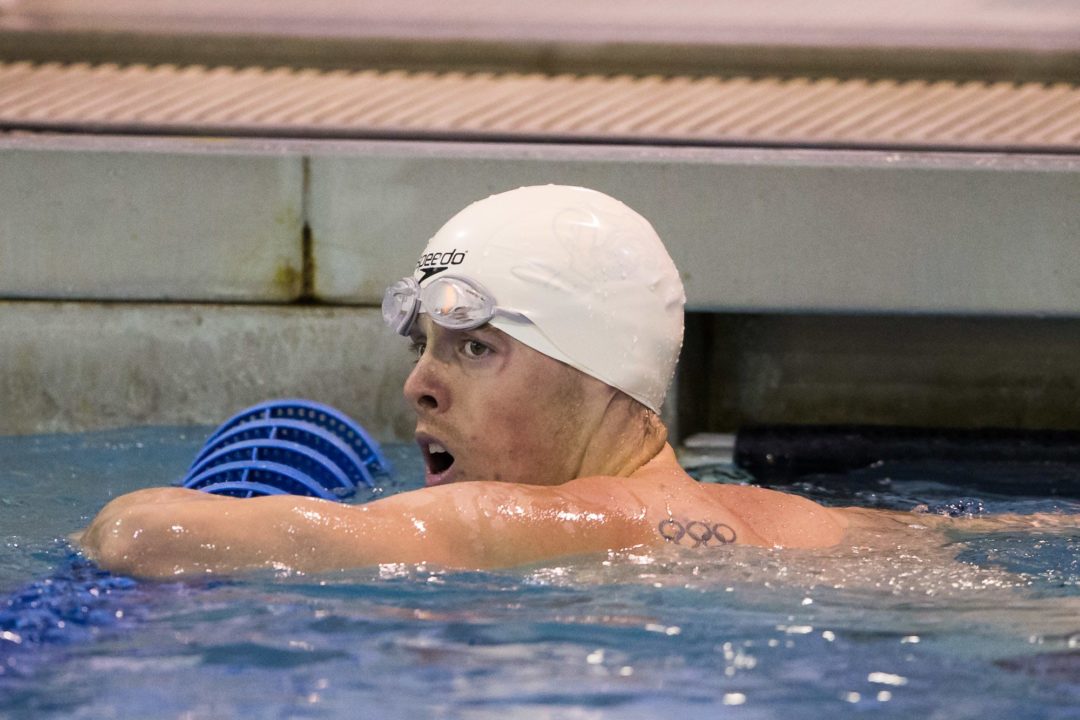The following report was contributed by Christina Wright.
While the sun dipped below the horizon this evening in Santa Clara, California, the George F. Haines International Swim Center’s pool was ablaze with distance dynamos. Night one of the 2013 Santa Clara Grand Prix featured the non-Olympic distance events: four heats of the men’s 800, and three heats of the women’s 1500.
Women’s 1500 Free
The women’s 1500 was comprised of an international field, true to the meet’s name, with Canadian standout Tabitha Baumann, 17, touching first with a respectable 16:37.03. Baumann recently took first place in the same event at the Canadian World Championship Trials, though she didn’t qualify for their World Championship team. Baumann is from the famed Baumann family; her father is Olympic champion Alex, and her brother Ashton made the Canadian World Championship team in the 200 breaststroke – Tabitha bucks the family trend a little by going after these distance freestyles.
Susana Escobar , the 25-year-old Olympian from Mexico, claimed second place with a 16:40.53, and Brazil’s Carolina Bilich Queiroz, another 17-year old, rounded out the field with a 17:00.42.
Men’s 800 Free
The meet record in the men’s 800 didn’t stand a chance thanks to US Olympian and Michigan senior-to-be Connor Jaeger; the 22-year-old clocked a 7:50.14, almost two seconds faster than the previous benchmark set by Korea’s Taehwan Park.
Remember that Jaeger is still relatively new as a distance swimmer, and up until the Charlotte Grand Prix, most of his best swims in this event were splits en route to a 1500. In Charlotte he was a 7:53, and now he’s been 7:50.
Australia’s teenager distance star, 17-year-old Mack Horton, took second with a 7:59.64. That’s a best time for him as well, and the first time he’s been under eight minutes. Canadian Olympic distance medalist Ryan Cochrane turned in a 7:59.71 for third.
Cochrane is the defending World Championship silver medalist in the event and one of the fastest in history. Though this was well off of his time from Worlds Trials (about 16 seconds slower), his times during this part of the year are wildly inconsistent and usually result in a good season-finish regardless.
Cochrane’s training partner at Island Swimming, Alex Page, took 4th in 8:06.47, followed by American Michael Klueh and a third Island Swimming (and Cal) swimmer Jeremy Bagshaw.

Mack Horton is super fast Christina but the other 17 year old Aussie(Jordan Harrison) is even more of a star. Going 14:52 and 3:45 as a 17 year old is unreal!
confused…why did she win the world champ trials but didn’t make the championship team???
1500 free for women was not a selection event, so nobody was selected for the event. Not sure how we (Canadians) are going to select athletes for off-distance events and stroke 50s.
Perhaps because she hasn’t swum enough fast. Her time from these trials was 16.34.29 and the Fina A standard for Barcelona is 16.26.36. I don’t know but it’s just an idea. By the way, if someone could explain to me these stories of A and B standards and the differences between both, I’m interested.
Under FINA rules, a country can send 2 athletes per event if they both are under the A cut. If the best swimmer in the country has an A cut, and the 2nd place swimmer only a B cut.. only the A cut person can go.
If for example 10 people have B cuts, the given country can send only 1 person (usually the best person).
However, some countries do not let people go with only a B cut so they need A cuts.
Also, some countries set their qualifying standards faster than the FINA A cut so they only send swimmers that achieve those
Thank you. Clear explanation.
why would a country not want to send two swimmers with A cuts?
To save money.
MCGILLROCKS,
Some countries set their standards faster than the A cuts (there are numerous example where they set the qualifying standard to be top 16 or top 20 in the world from the previous end of the year rankings)
I think this is to ensure a minimum of a semifinal at the BIG meet. I believe that Brasil did something like this for Barcelona in the non-olympic events.
Also Germany was being criticized for the tough standards for Shanghai in 2011, but their goal is final swims and medal hopes .. participation only is probably not enough
Fina A Standards are ‘Automatic Qualifying Times’. Countries may send up to 2 swimmers who make the Fina A time at a selection event. B times are not automatic, and countries may only send 1 swimmer if nobody makes the A, as long as that swimmer made the ‘B’ time. Countries may also only send 1 swimmer if only 1 swimmer made the ‘A’ time.
Thank you for the explanation. Now it’s clear.
CJ = Major upside and tip of the iceberg potential! Keep workin’ CJ… I am a believer!
Mack Horton = scary good! I wonder how good?
Great 800 field at Santa Clara!